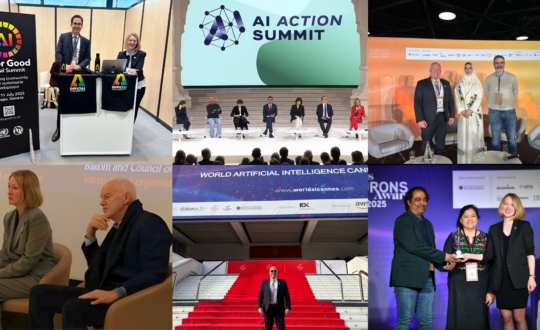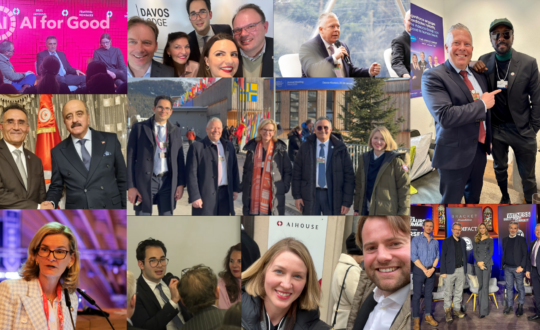Discover the full AI Governance Day 2024 Report – From Principles to Implementation here.
Panelists:
- H.E. Ms. Emma Inamutila Theofelus, Minister of Information and Communication Technology, Namibia
- H.E. Mr. Mauricio Lizcano, Minister of Information Technologies and Communications, Colombia
- H.E. Mr. Zunaid Ahmed Palak, Minister of State for the Ministry of Posts, Telecommunications and Information Technology, Bangladesh
Moderator:
- Robert F. Trager, Professor at the University of Oxford
The three ministers summarized the discussions in the morning with 200 attendees. The panel discussion underscored the importance of a coordinated, inclusive, and human-centric approach to AI governance. The ministers highlighted both the opportunities and challenges that lie ahead in the realm of AI. As Minister Palak aptly quoted his Prime Minister, “If you want to go fast and far, innovate together.” This sentiment encapsulates the spirit of global cooperation needed to navigate the complexities of AI governance and ensure that its benefits are shared equitably across the world.
Minister Theofelus, Namibia
Minister Emma Theofelus kicked off the discussion by highlighting the productive nature of the morning’s conversations. She outlined several critical areas of focus
- Global coordination: The necessity of coordinating diverse efforts at a global level to reduce fragmentation among UN agencies, governments, and regional bodies.
“Governance is surely broader than regulation, and therefore we need to reduce the fragmentation […] to ensure that we have standards that we can all comply [with] around AI governance.” (Emma Inamutila Theofelus)
- Human-centric AI: Ensuring that AI remains focused on human rights and maintaining a human element in its applications.
- Leveraging existing instruments: Building on existing frameworks and regulations, rather than reinventing the wheel.
“We don’t necessarily need to create […] or build new institutions, we can already build on existing capacities and existing institutions.” (Emma Inamutila Theofelus)

Ms. Emma Inamutila Theofelus, Minister of Information and Communication Technology, Namibia
- Inclusive data governance: Addressing data governance as a fundamental step to inclusive AI governance.
“We need everybody around the table, whether it’s global north or […] south, to ensure that nobody is left behind.” (Emma Inamutila Theofelus)
- Local applicability: Considering national capacities, cultural, and linguistic differences to avoid biases in AI systems.
- Keeping up with technology: Involving AI developers in governance discussions to keep pace with the fast-evolving nature of AI.
- Balancing regulation and innovation: Ensuring that regulation does not stifle innovation but instead sparks it.
“We must strike a balance between regulation and innovation and ensure that regulation actually sparks innovation” (Emma Inamutila Theofelus)
- Parallel discussions: Promoting continuous dialogue among all stakeholders to avoid isolated discussions between producers and users of AI.
Minister Lizcano, Colombia
Minister Mauricio Lizcano of Colombia provided a reflection on the risks and opportunities AI presents. He stressed the importance of human-centric AI and the need for global cooperation. Minister Lizcano highlighted two major risks:
- Human-serving AI: Ensuring that AI serves humanity and not the other way around.
- Competition: Managing the competition between companies and countries to prioritize safety over winning the AI race.
He called for a democratization of AI, ensuring that it is not limited to a select few but is accessible and understandable to all.
“AI doesn’t have to be a discussion [among] elite people […] we need real people to understand what is happening with AI.” (Mauricio Lizcano)
Mr. Minister Lizcano also shared Colombia’s ambitious initiatives to democratize AI through education and capacity building.
“In Colombia, we are training secondary [students] in machine learning and python [coding] […] creating the first faculty of AI in Latin America.” (Mauricio Lizcano)

H.E. Mr. Mauricio Lizcano, Minister of Information Technologies and Communications, Colombia
Mr. Minister Palak, Bangladesh
Mr. Minister Zunaid Ahmed Palak of Bangladesh introduced the development of “G Brain,” a government AI aimed at enhancing service delivery.
“Our most ambitious initiative in Bangladesh is the development of government brain, in short G Brain.” (Zunaid Ahmed Palak)
Mr. Minister Palak recounted a recent demonstration where a startup created his digital twin using AI, showcasing AI’s potential in education and training.
“This experience was both fascinating and eye-opening.” (Zunaid Ahmed Palak)

H.E. Mr. Zunaid Ahmed Palak, Minister of State for the Ministry of Posts, Telecommunications and Information Technology, Bangladesh
However, Minister Palak also warned of the dangers of AI-generated misinformation, citing a recent incident involving a fake photograph of a cyclone’s aftermath.
“This incident highlights a serious risk associated with AI defects, spray of fake information and the consequences of which can be dire, affecting social harmony, public safety and the credibility of our institutions” (Zunaid Ahmed Palak)
He called for robust measures to counteract the misuse of AI, emphasizing the need for ethical guidelines and regulatory frameworks.
“We must also develop robust measures to safeguard against this misuse [through] ethical guidelines and regulatory frameworks to ensure AI is used responsibly” (Zunaid Ahmed Palak).

















